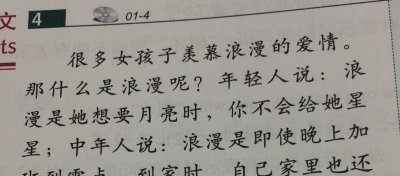This dialogue is from the book Standard Course 标准教程 HSK4 上, page 8 (JD.com):
I'm interested in this part:
... 年轻人说:浪漫是她想要月亮时,你不会给她星星 ...
I (literally) translate this to:
Young people [年轻人] say [说]: romance [浪漫] is [是] when [...时] she [她] wants [想要] the moon [月亮], you [你] cannot [不会] give [给] her [她] a star [星星].
My feeling is that this sentence implies that young romance is about selfish women: she's unwilling to accept a star (in place of the moon), and may even get angry should her partner give her something other than the moon (despite it being as amazing as a star). Her partner must strive to follow her wishes, even if they are unreasonable. Thus, my impression is that this sentence is belittling of young love, and particularly of young women.
Basically my question is: is this the intended interpretation?
Question: Is the non-literal interpretation of this sentence that young romance is selfish, particularly of women?
